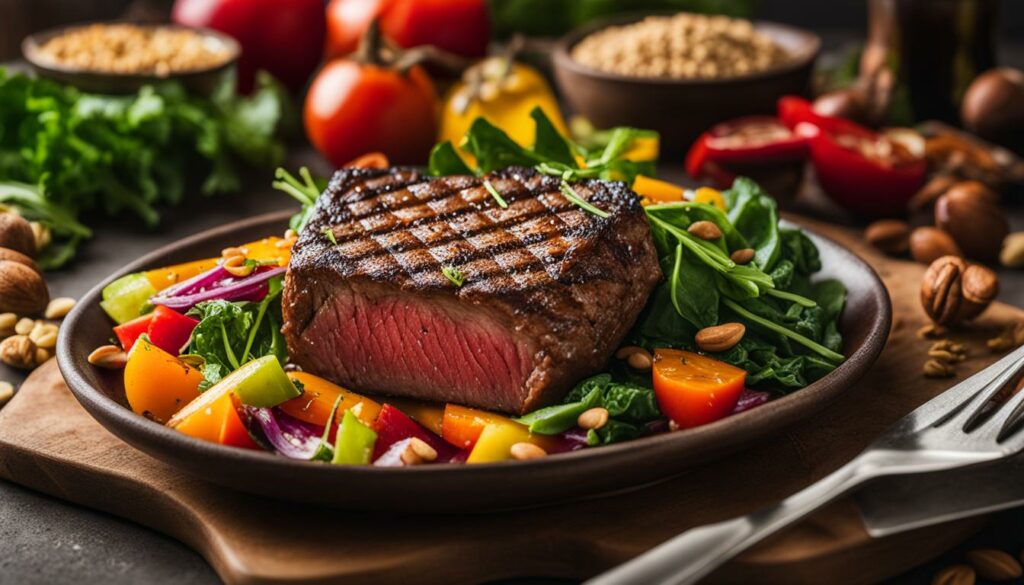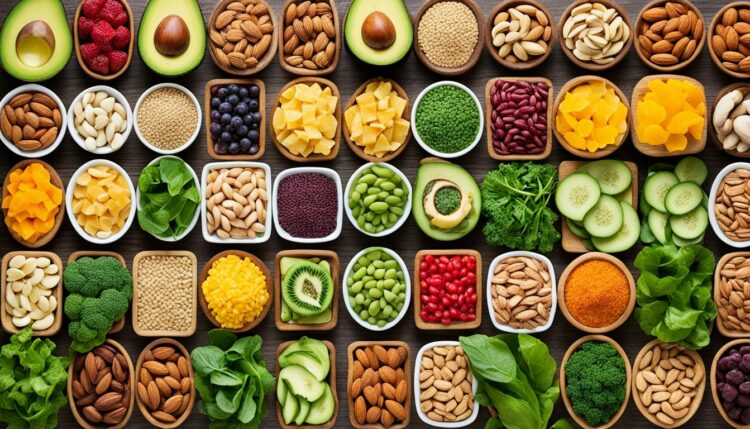Did you know that B vitamins are essential for energy production, brain function, and overall health?
With eight B vitamins in the B complex, including thiamine (B1), riboflavin (B2), niacin (B3), pantothenic acid (B5), pyridoxine (B6), biotin (B7), folate (B9), and cobalamin (B12), these vitamins play a crucial role in energy metabolism and the production of important molecules in the cells.
Considering the importance of B vitamins, it’s crucial to regularly consume foods that are rich in these nutrients. In this article, we’ll explore the top vitamin B foods that can provide you with a nutrient boost.
Whether you’re looking for sources of vitamin B, the best vitamin B foods, or natural vegetarian vitamin B foods, we’ve got you covered!
Key Takeaways:
- B vitamins are essential for energy production and overall health.
- There are eight B vitamins that make up the B complex.
- The body cannot store these vitamins for long periods, so it’s important to consume foods high in B vitamins regularly.
- The top vitamin B foods include salmon, leafy greens, organ meats, eggs, milk, and beef.
- By incorporating these foods into your diet, you can boost your nutrient intake and support your body’s needs.
Salmon
Salmon is a nutritious fish that is high in several B vitamins. A 3.5-ounce serving of cooked salmon provides significant amounts of vitamin B6, vitamin B12, vitamin B2, vitamin B1, and other valuable nutrients.
Here is a breakdown of the B vitamins found in a 3.5-ounce serving of cooked salmon:
| Vitamin | DV % |
|---|---|
| Thiamine (B1) | 23% |
| Riboflavin (B2) | 37% |
| Niacin (B3) | 63% |
| Pantothenic Acid (B5) | 38% |
| Pyridoxine (B6) | 56% |
| Cobalamin (B12) | 127% |
In addition to providing B vitamins, salmon is also an excellent source of omega-3 fats and protein, making it a healthy choice for overall nutritional intake.
Leafy Greens
Leafy greens, such as spinach, collard greens, turnip greens, and romaine lettuce, are an excellent addition to your diet if you’re looking for foods high in vitamin B. These greens are not only low in calories but also packed with essential nutrients, including several B vitamins.
Spinach: Spinach is a versatile leafy green that provides a wide range of vitamins and minerals. When it comes to B vitamins, spinach is a great source of folate (B9), vitamin B6, vitamin B2, and vitamin B1. Consuming just one cup of cooked spinach can provide up to 66% of the recommended daily value (DV) for folate.
Collard Greens: Collard greens are another nutritious leafy green that can boost your vitamin B intake. They are rich in folate, vitamin B6, vitamin B2, and vitamin B1. One cup of cooked collard greens provides about 23% of the DV for folate.
Turnip Greens: Turnip greens are an excellent source of vitamin B6, vitamin B2, and vitamin B1. These greens are also a good source of folate. Incorporating turnip greens into your meals can help increase your intake of these essential B vitamins.
Romaine Lettuce: Romaine lettuce is a popular salad green that can contribute to your vitamin B intake. While romaine lettuce is not as high in B vitamins as other leafy greens, it still provides small amounts of folate, vitamin B6, vitamin B2, and vitamin B1.
To retain the most folate and other nutrients, it is recommended to enjoy leafy greens either raw in your salads or briefly steam them. This preserves their nutritional value and ensures you get the maximum benefits from these vitamin-packed greens.
| Leafy Green | Vitamin B9 (Folate) (% of DV*) |
Vitamin B6 (% of DV*) |
Vitamin B2 (% of DV*) |
Vitamin B1 (% of DV*) |
|---|---|---|---|---|
| Spinach (1 cup, cooked) | 66% | 9% | 15% | 7% |
| Collard Greens (1 cup, cooked) | 23% | 9% | 10% | 7% |
| Turnip Greens (1 cup, cooked) | … | … | … | … |
| Romaine Lettuce (1 cup) | … | … | … | … |
Liver and Other Organ Meats
Organ meats, particularly liver, are packed with essential B vitamins, making them a nutrient-rich addition to your diet. A 3.5-ounce serving of beef liver provides an impressive range of B vitamins. Here’s a breakdown of the vitamin content:
- Thiamine (B1): 15% of the DV
- Riboflavin (B2): 263% of the DV
- Niacin (B3): 109% of the DV
- Pantothenic Acid (B5): 139% of the DV
- Pyridoxine (B6): 61% of the DV
- Biotin (B7): 139% of the DV
- Folate (B9): 63% of the DV
- Cobalamin (B12): a whopping 2,917% of the DV
If the flavor of liver is unappealing, you can still enjoy its nutritional benefits by grinding it and mixing it with other ground meat or incorporating it into highly seasoned dishes. This way, you can reap the rewards of these vitamin-packed organ meats.
Eggs
Eggs are a nutritional powerhouse, packed with various essential nutrients, including a range of B vitamins. One large egg offers a significant dose of biotin (B7), providing 35% of the DV.
Biotin is essential for healthy hair, skin, and nails, and it also plays a role in energy metabolism. In addition to biotin, eggs contain several other B vitamins, such as:
- Vitamin B2 (Riboflavin): One large egg provides 20% of the DV for vitamin B2. Riboflavin is important for energy production, cellular function, and the metabolism of fats, proteins, and carbohydrates.
- Vitamin B5 (Pantothenic Acid): With 14% of the DV, eggs are a good source of pantothenic acid. This vitamin is involved in various bodily processes, including the production of energy and the synthesis of essential molecules like hormones and neurotransmitters.
- Vitamin B12 (Cobalamin): Eggs offer 23% of the DV for vitamin B12, a nutrient crucial for the formation of red blood cells, DNA synthesis, and proper nerve function.
- Vitamin B9 (Folate): While eggs contain a smaller amount of folate compared to other B vitamins, one large egg still contributes 6% of the DV. Folate is essential for cell growth and division, making it especially important during pregnancy.
- Vitamin B1 (Thiamine): Eggs also contain thiamine, although it is present in smaller amounts. Thiamine plays a vital role in energy metabolism and the proper functioning of the nervous system.
It’s worth noting that cooking eggs reduces the activity of avidin, a protein that can hinder biotin absorption. Therefore, eating cooked eggs ensures better bioavailability of this essential B vitamin.
Whether enjoyed scrambled, boiled, or in various dishes, eggs are a versatile and nutritious choice that can help you meet your B vitamin needs.

Milk
Milk is a good source of several B vitamins, making it an excellent addition to your diet. This nutritional powerhouse provides essential nutrients that promote overall health and well-being.
A cup of milk contains significant amounts of key B vitamins, including:
- Riboflavin (B2): Milk supplies 32% of the Daily Value (DV) for riboflavin. This essential vitamin plays a crucial role in energy production, cell growth, and the metabolism of fats and carbohydrates.
- Cobalamin (B12): With 46% of the DV, milk is a great source of vitamin B12. This vitamin is essential for maintaining healthy nerve cells, producing DNA, and preventing certain types of anemia.
- Thiamine (B1): Milk provides 9% of the DV for thiamine, which is necessary for maintaining a healthy nervous system and converting food into energy.
These B vitamins are vital for promoting energy metabolism, supporting brain function, and maintaining a healthy nervous system.
Did you know that milk is the top source of riboflavin in people’s diets, followed by meat and grains? Incorporating milk into your daily routine can help ensure you’re getting an adequate intake of this essential B vitamin.
Include milk in your diet by drinking it plain, adding it to your morning coffee or tea, or using it as a base for delicious smoothies. You can also enjoy milk with your favorite cereal or use it in cooking and baking recipes.
Whether you prefer skim, low-fat, or whole milk, this versatile beverage is a convenient and tasty way to boost your B vitamin intake and support your overall health and well-being.
Beef
Beef is a nutrient-packed meat that makes a valuable contribution to your B vitamin intake. A 3.5-ounce serving of beef provides essential B vitamins, including:
Vitamin B3 (Niacin) – 49% of the daily value
Vitamin B6 (Pyridoxine) – 36% of the daily value
Vitamin B12 (Cobalamin) – 72% of the daily value
Vitamin B2 (Riboflavin) – 11% of the daily value
Vitamin B1 (Thiamine) – 7% of the daily value
These B vitamins play vital roles in energy production, metabolism, and overall cellular health. Incorporating beef into your diet allows you to enjoy the benefits of these essential nutrients.
Beef’s B Vitamins at a Glance
| Vitamin | Percentage of Daily Value |
|---|---|
| Vitamin B3 (Niacin) | 49% |
| Vitamin B6 (Pyridoxine) | 36% |
| Vitamin B12 (Cobalamin) | 72% |
| Vitamin B2 (Riboflavin) | 11% |
| Vitamin B1 (Thiamine) | 7% |
Including a variety of B vitamin-rich foods like beef in your diet ensures you meet your nutritional needs and supports your overall health and well-being.

Conclusion
In conclusion, incorporating vitamin B foods into your diet is crucial for maintaining optimal energy levels, supporting brain function, and promoting overall health.
The B complex vitamins, including B1, B2, B3, B5, B6, B7, B9, and B12, play essential roles in various bodily functions, such as energy metabolism and the production of important molecules in the cells.
Some of the best natural sources of vitamin B include salmon, leafy greens, organ meats, eggs, milk, and beef. These foods are high in different B vitamins, such as B6, B12, B2, B1, and more.
By incorporating a variety of these nutrient-rich foods into your meals, you can ensure that you are getting an adequate intake of B vitamins.
For those following a vegetarian or vegan diet, there are plenty of plant-based sources of vitamin B available. Leafy greens, such as spinach and kale, along with fortified plant-based milk and nutritional yeast, are excellent choices for obtaining B vitamins in a vegetarian or vegan diet.
By making these vitamin B foods a part of your regular diet, you can support your body’s needs and maintain optimal health and well-being.
FAQ
What are the best sources of vitamin B?
Some of the top vitamin B foods include salmon, leafy greens, organ meats, eggs, milk, beef, and more.
Which B vitamins are found in salmon?
Salmon is high in several B vitamins, including thiamine (B1), riboflavin (B2), niacin (B3), pantothenic acid (B5), pyridoxine (B6), and cobalamin (B12).
What B vitamins can be found in leafy greens?
Leafy greens, such as spinach, collard greens, turnip greens, and romaine lettuce, are rich in folate (B9), vitamin B6, vitamin B2, and vitamin B1.
Which B vitamins are abundant in liver and other organ meats?
Liver and other organ meats are packed with various B vitamins, including thiamine (B1), riboflavin (B2), niacin (B3), pantothenic acid (B5), pyridoxine (B6), biotin (B7), folate (B9), and cobalamin (B12).
What B vitamin is found in eggs?
Eggs are a top source of biotin (B7), and they also contain other B vitamins such as vitamin B2, vitamin B5, vitamin B12, vitamin B9, and vitamin B1.
Which B vitamins can be obtained from milk?
Milk is a good source of several B vitamins, including riboflavin (B2), cobalamin (B12), and thiamine (B1).
What B vitamins can be found in beef?
Beef contributes to the intake of B vitamins, including niacin (B3), pyridoxine (B6), cobalamin (B12), riboflavin (B2), and thiamine (B1).
Why are B vitamins important for our health?
B vitamins are essential for energy production, brain function, and overall health. They play a crucial role in energy metabolism and the production of important molecules in the cells.
How can incorporating vitamin B foods into our diet benefit us?
By including a variety of vitamin B foods in your meals, you can boost your nutrient intake and support your body’s needs for energy and overall health.




